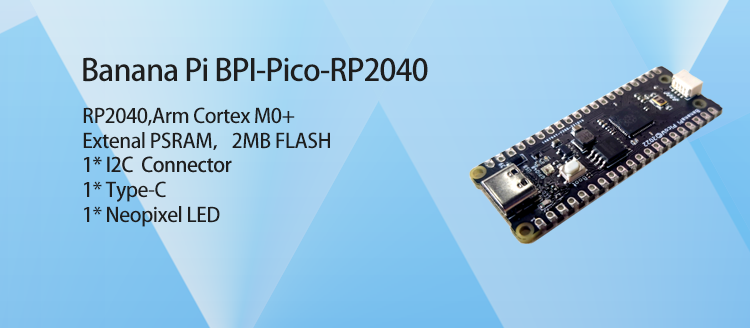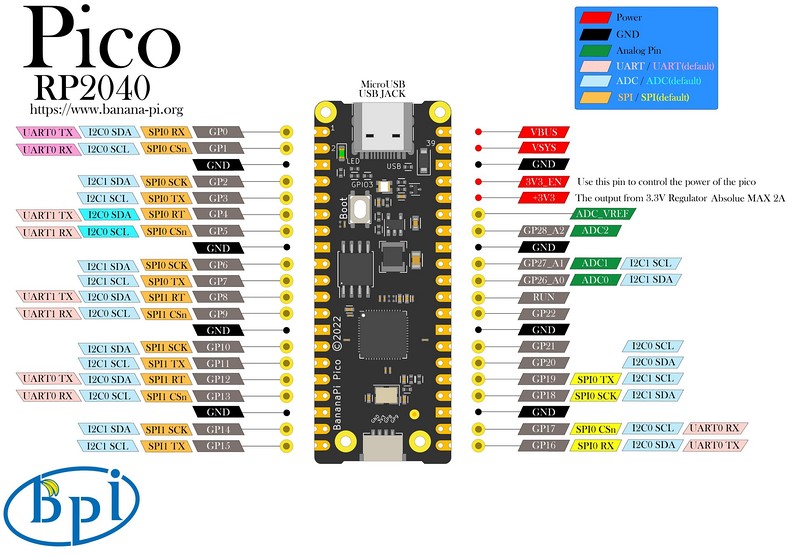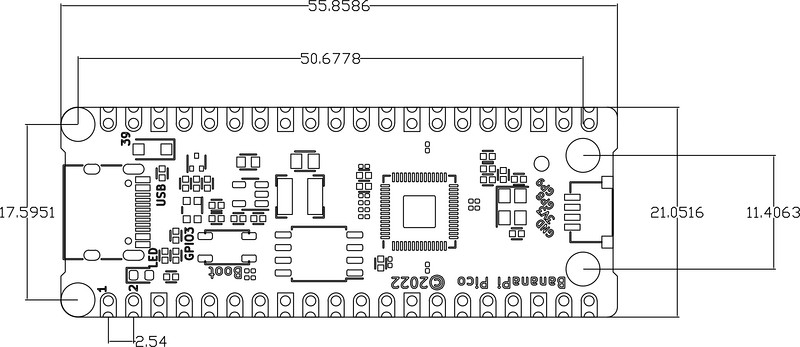Difference between revisions of "BPI-Pico-RP2040"
| Line 32: | Line 32: | ||
[[File:BPI-Pico-RP2040-V0.2-IO_800.jpg|800px]] | [[File:BPI-Pico-RP2040-V0.2-IO_800.jpg|800px]] | ||
| + | |||
| + | == Hardware spec == | ||
| + | |||
| + | {| class="wikitable" | ||
| + | |- | ||
| + | ! colspan="2" style="background-color:#ffcb2f;" | BPI-Pico-RP2040 Spec Sheet | ||
| + | |- | ||
| + | | Main Chip | ||
| + | | RP2040,Dual-core ARM Cortex M0+ CPU cores | ||
| + | |- | ||
| + | | Frequency | ||
| + | | 133MHz MAX | ||
| + | |- | ||
| + | | Operating temperature | ||
| + | | -20℃~+85℃ | ||
| + | |- | ||
| + | | On-chip SRAM | ||
| + | | 264 KB | ||
| + | |- | ||
| + | | On-board FLASH | ||
| + | | 2MB | ||
| + | |- | ||
| + | | GPIO | ||
| + | | 26 GPIO | ||
| + | |- | ||
| + | | ADC | ||
| + | | 4 analogue inputs | ||
| + | |- | ||
| + | | rowspan="6" | PIO | ||
| + | | I2C | ||
| + | |- | ||
| + | | SPI,DSPI,QSPI | ||
| + | |- | ||
| + | | UART | ||
| + | |- | ||
| + | | SDIO (SD card) | ||
| + | |- | ||
| + | | I2S | ||
| + | |- | ||
| + | | 8080 and 6800 parallel port | ||
| + | |- | ||
| + | | USB input voltage | ||
| + | | 5V | ||
| + | |- | ||
| + | | 3V3 output current | ||
| + | | 2A MAX | ||
| + | |- | ||
| + | | Neopixel LED | ||
| + | | 1 | ||
| + | |- | ||
| + | | LED | ||
| + | | 1 | ||
| + | |- | ||
| + | | USB Type-C socket | ||
| + | | 1 | ||
| + | |- | ||
| + | | JST SH 4pin socket | ||
| + | | 1 | ||
| + | |} | ||
| + | |||
== Hardware Size == | == Hardware Size == | ||
Revision as of 01:24, 2 December 2022
Contents
Introduction
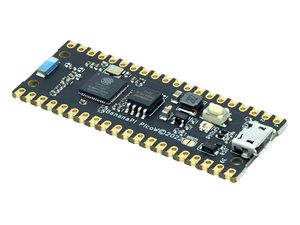
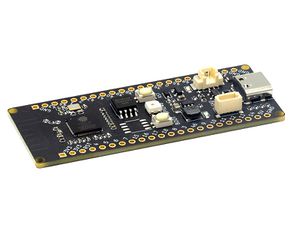
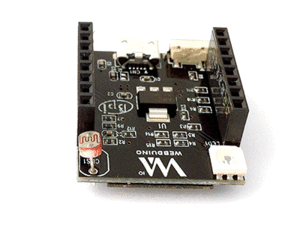
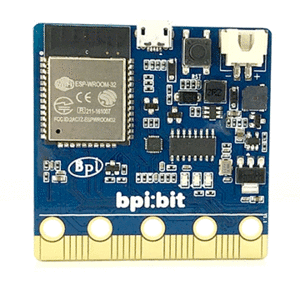
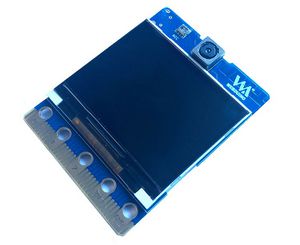
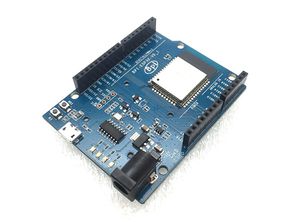
The Banana Pi Pico series is a low-power microcontroller development board designed for the Internet of Things.
BPI-Pico-RP2040 is a microcontroller development board launched by Banana Pi equipped with RP2040 chip. Its most notable feature is to add a Onboard WS2812 color LED; replace the 3-Pin DEBUG interface with a JST SH 1mm 4-Pin socket, which can be connected with Qwiic & STEMMA QT or any possible peripherals; replace the micro-USB socket with a USB Type-C socket , supports reversible insertion, and is compatible with the USB Type-C cable of most modern smartphones, no additional purchase is required.
key features
- Dual-core ARM Cortex M0+ CPU cores (up to 133 MHz)
- 264K SRAM
- 2MB Flash
- 26 available GPIO pins, 4 of which support ADC analog input
- 1 x LED
- 1 x WS2812 LED
- 1 × JST SH 1mm 4-Pin socket
- 1 × USB Type-C socket
Hardware
Hardware interface
Hardware spec
| BPI-Pico-RP2040 Spec Sheet | |
|---|---|
| Main Chip | RP2040,Dual-core ARM Cortex M0+ CPU cores |
| Frequency | 133MHz MAX |
| Operating temperature | -20℃~+85℃ |
| On-chip SRAM | 264 KB |
| On-board FLASH | 2MB |
| GPIO | 26 GPIO |
| ADC | 4 analogue inputs |
| PIO | I2C |
| SPI,DSPI,QSPI | |
| UART | |
| SDIO (SD card) | |
| I2S | |
| 8080 and 6800 parallel port | |
| USB input voltage | 5V |
| 3V3 output current | 2A MAX |
| Neopixel LED | 1 |
| LED | 1 |
| USB Type-C socket | 1 |
| JST SH 4pin socket | 1 |
Hardware Size
| BPI-PicoW-S3 size chart | |
|---|---|
| Pin spacing | 2.54mm |
| Mounting hole spacing | 17.6mm/ 11.4mm |
| Mounting hole size | Inner diameter 2.1mm/outer diameter 3.4mm |
| Mainboard size | 11.4 × 55.8(mm) |
| Thickness | 1.2mm |
The pin spacing is compatible with universal boards (hole boards, dot matrix boards) and breadboards, which is convenient for debugging applications.
